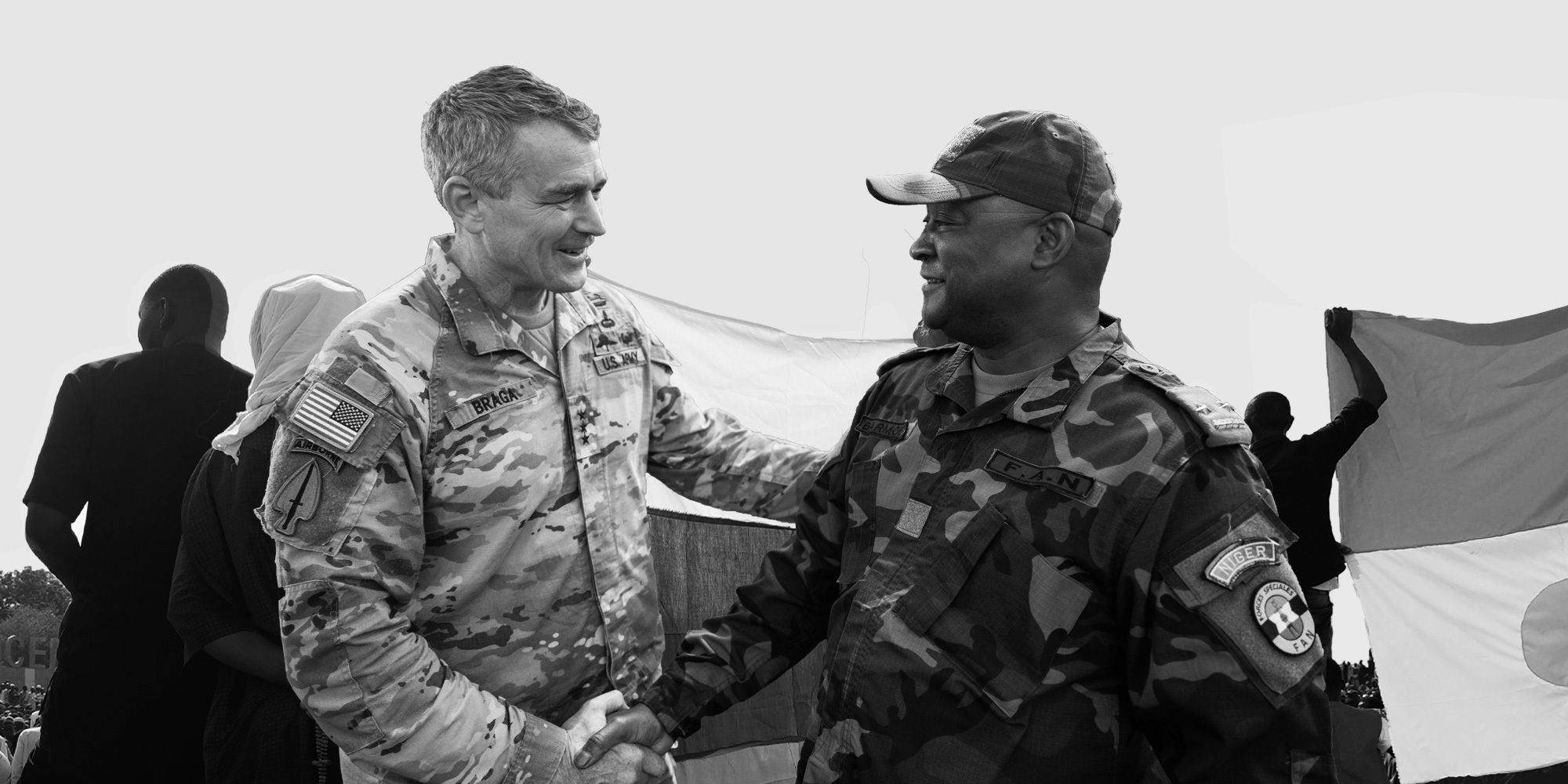Troops from Niger ousted the country’s democratically elected president, Mohamed Bazoum, last week. One of the coup leaders had previously received training from the U.S. government, becoming the 11th coup in the region led by U.S.-trained officers since 2008.
Spoiler: the article does not suggest the US is causing the coups.
Yeah as usual the Intercept buries the lede to twist the article into some anti-US hit piece, Glenn Greenwald has been a Putin shill for a while now and his outlet constantly shows it.
The officers this article is trying to call out were trained to go against Burkina Faso, Boko Haram, Al Quida, and ISIS, also once the military Junta overthrew rightful government the military Junta immediately ran to Wagner for backup, showing that they’re choosing to be backed by the Ruzzians. In reality the US is trying to keep the peace in Niger and is work to get the ousted president to safety.
No doubt he used to be a major part of the staff, but Greenwald hasn’t been with the Intercept for years now.
In reality the US is trying to keep the peace in Niger and is work to get the ousted president to safety.
The article makes this point too though.
-
The US has a military base in Niger as does France, and Mohamed Bazoum is a close ally of the West.
-
Niger is also a big uranium exporter.
Of course the US is not trying to stage a pro-Wagner coup there.
That would not make any sense, and it’s not what this article is suggesting at all. I don’t think it’s a “hit piece”, it simply provides a lot of nuance to the Sahel situation.
If that was the case, why open with such a framing remark.
Stating they’re US trained before any other information is purely to make readers think it’s US caused.
At best it’s simply clickbait, most likely it’s deliberate anti-US propaganda/misdirection , and I say this as someone who really fucking hates America.
Hmm, I’m having trouble understanding why you still think this is propaganda now that you’ve read the article.
I say this as someone who is a lot more interested in the Sahel than I am in US roles in geopolitics.
I posted it in good faith because I think it is a good article especially for people who are puzzled by the coup background now that Niger is in the Western news cycle for a change.
Can’t please everyone though.
Thanks for taking the time to talk to me about it by the way.
Did the US provide direct training in how to destabilize and overthrow a government? Because they have teams that can provide that training. It’s routinely used in the Western hemisphere. If they gave the coup leaders anti-insurgency training, that’s an entirely different situation.
The problem is probably more coincidental. US training makes units better. There’s a base level of thought in the US military though which you can describe as “you follow orders of the duly elected representatives of the US government.” If you don’t instill that base thinking, all the training does is make military units that are going to succeed at coups.
So is this article dealing with the reality of trying to rewrite a foreign military’s thought process and it’s relationship to its civilian government? Does it discuss the difficulties in doing that while trying to train them for counterinsurgency operations? If it’s just making a casual (not causal) connection between the coup leaders and the fact that at some point those leaders had US training, it’s propaganda.
I don’t think it’s making a 1:1 causal connection at all.
I’m sorry if this is impolite of me, but have you read the article itself?
The headline is unfortunately clickbaity and it seems to have attracted a few people who want to argue with what they think the headline alone implies about the US, but the subeditor who wrote it is not on the same page as the interviewee.
It’s a pity, but I don’t like editorialising titles for anything other than clarity. I might have to rethink that.
As far as the interview goes, if there is a correlative connection in there it’s to do with the rise of terrorism in the Sahel region during the “war on terror” and obviously that has a lot to do with the militarization of enforcers for oil and mining companies.
The main thing that makes it a hit piece is that it buried the lede about the US’s efforts to stabilize the situation, it blatantly words the headline in a way to make those people who just read headlines say “US sponsors a coup in Niger” that’s the way it sounded to me until I read the article. Without the detail that these officers were trained for in counter terrorism to fight a very real terrorist threat the headline absolutely makes it sound like the US was training these guys to go coup’ing. It’s a fairly typical tactic that the Intercept and other less than reputable news organizations use to push their agenda.
-
I’ll suggest it. They are. They did the same to my country and now they own most of it
Bro, the guy is publicly fellating Putin and telling US allies to get out, after couping a liberal.
Now, if he’d couped a socialist, sure, that was probably the point, but the guy going to a seminar on counter-terror one time doesn’t make him a CIA asset.
Some really great background here. Excerpt:
the United States has been involved here since about 2002, 2003, but when they first got involved, there was very little terrorist activity in the region. But, over the period of the last 20 years, there’s been a tremendous rise, and it’s taken place in an area they call Liptako Gourma, a tri-border region where Mali, Niger and Burkina Faso all meet.
Basically, there are a number of terrorist groups operating there. Some are Al Qaeda affiliated, some are affiliated with the Islamic state, some are free agents, but they have a very similar playbook. These are jihadists who generally attack on motorcycle. They will roll into villages; generally, they’ll come before attacking, to tell people how they want them to dress, to act.
These are, generally, in these countries, Muslim people, but they want them to ascribe to a more strident version of Islam. They want women to wear the veil, they want men to wear short pants, they want alcohol to be completely verboten. And, if you don’t comply — if you don’t pay Zakat, the Islamic tax — they will come back, and they will come back shooting. And they’ve terrorized villages in these regions and, generally, the militaries of these countries have been unable to protect their people.
The United States has poured security aid in, supposedly to bolster these militaries, to make them more effective in protecting their people. But, every year over the last ten years, the number of terrorist attacks have gone up, the number of civilian fatalities has gone up.
And, basically, the only metric where the United States has been successful is training military officers who are able to overthrow their own governments. They’ve been unable to combat the jihadists in any kind of effective way.
JS: Nick, there’s a lot of pushback against France happening on the African continent, especially in countries where French colonialism reared its ugly head for a sustained period of time, and both the United States and France have troops that are on the ground in Niger. I think, by last time I checked, France has roughly one and a half thousand troops there, and there are more than a thousand — I think 1,100 — U.S. troops. And most of those, as I understand, are stationed at drone bases that are used to carry out strikes, either in Niger or elsewhere.
But talk a little bit about the place that French colonialism holds in, not just Niger’s current day politics, but also in some of the other coups or rebellions that we’ve seen in former French colonial nations in Africa.
NT: Yeah. There’s a great deal of anti-French sentiment in the Western Sahel, in the countries that I talked about — Niger, Burkina Faso, Mali — and the United States has been really wired into the French military response there. [They] aided France in many ways with ISR, intelligence, surveillance, reconnaissance, worked alongside French troops.
But the militaries in these countries and the civilian populations have really soured on the French who, as you mentioned, the colonial relationship there has never really gone away. These are still treated by France as de facto colonies in many ways, French corporations dominate the landscape there, and people see them as very extractive, taking mineral wealth, uranium, you know? And people want these resources back, and don’t think the French should have their hands on them.
And I think the United States has, because they’re so wired in with the French, has taken on some of that colonial sheen. You know, the population sees them as working together. So, that hasn’t benefited the United States.
As is tradition.





